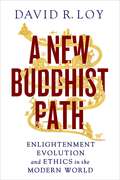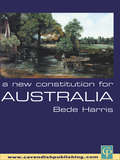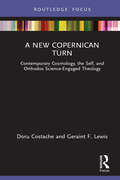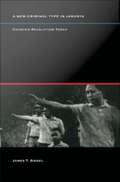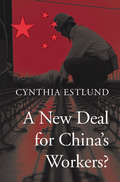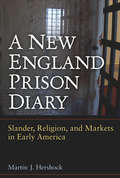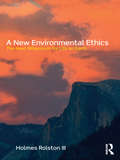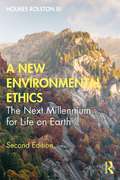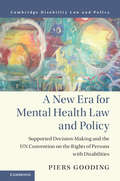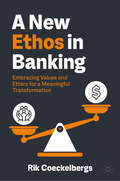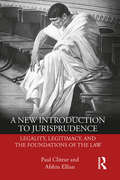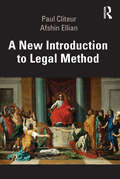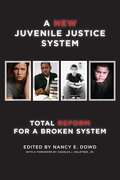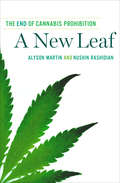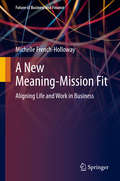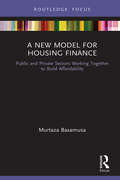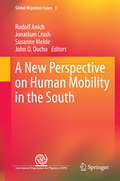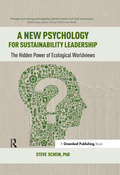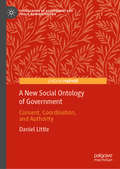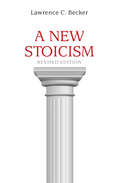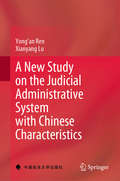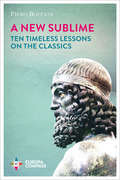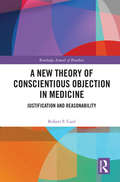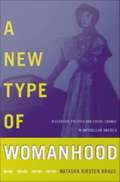- Table View
- List View
A New Buddhist Path
by David R. LoyEngage with a new vision of Buddhism and the modern world with the bestselling author of Money Sex War Karma: Notes for a Buddhist Revolution.David R. Loy addresses head-on the most pressing issues of Buddhist philosophy in our time. What is the meaning of enlightenment--is it an escape from the world, or is it a form of psychological healing? How can one reconcile modern scientific theory with ancient religious teachings? What is our role in the universe? Loy shows us that neither Buddhism nor secular society by itself is sufficient to answer these questions. Instead, he investigates the unexpected intersections of the two. Through this exchange, he uncovers a new Buddhist way, one that is faithful to the important traditions of Buddhism but compatible with modernity. This way, we can see the world as it is truly is, realize our indivisibility from it, and learn that the world's problems are our problems. This is a new path for a new world.
A New Buddhist Path: Enlightenment, Evolution, and Ethics in the Modern World
by David R. LoyEngage with a new vision of Buddhism and the modern world with the bestselling author of Money Sex War Karma: Notes for a Buddhist Revolution.David R. Loy addresses head-on the most pressing issues of Buddhist philosophy in our time. What is the meaning of enlightenment--is it an escape from the world, or is it a form of psychological healing? How can one reconcile modern scientific theory with ancient religious teachings? What is our role in the universe? Loy shows us that neither Buddhism nor secular society by itself is sufficient to answer these questions. Instead, he investigates the unexpected intersections of the two. Through this exchange, he uncovers a new Buddhist way, one that is faithful to the important traditions of Buddhism but compatible with modernity. This way, we can see the world as it is truly is, realize our indivisibility from it, and learn that the world's problems are our problems. This is a new path for a new world.
A New Constitution for Australia
by Bede HarrisFirst published in 2002. Routledge is an imprint of Taylor & Francis, an informa company.
A New Copernican Turn: Contemporary Cosmology, the Self, and Orthodox Science-Engaged Theology (Routledge Focus on Religion)
by Doru Costache Geraint F. LewisThis short book discusses the latest in terms of cosmology’s knowns and unknowns and sets out to ascertain the potential of Orthodox Christian theology for accommodating the current scientific view of the universe. It also addresses one of cosmology’s unknowns, the destiny of the self in the vastness of space, a topic that has caused angst since the dawn of modern science.The book examines, accordingly, the signs of a “New Copernican Turn” within contemporary culture, favouring the self and its meaningful encounters with the infinite universe, at the forefront of which being the quest for a physics that views something akin to the self as undergirding reality, not as an inconsequential byproduct of natural phenomena. The book further shows that theological, spiritual, and religious forms of nature contemplation and wonder facilitate the self’s creative intersection with the universe. It amounts to an exercise in science-engaged Orthodox theology that takes contemporary cosmology as a starting point.The intended audience of this book is scholars and researchers of science and religion, religious studies, philosophers, and theologians.
A New Criminal Type in Jakarta: Counter-Revolution Today
by James T. SiegelIn A New Criminal Type in Jakarta, James T. Siegel studies the dependence of Indonesia's post-1965 government on the ubiquitous presence of what he calls criminality, an ensemble of imagined forces within its society that is poised to tear it apart. Siegel, a foremost authority on Indonesia, interprets Suharto's New Order--in powerful contrast to Sukarno's Old Order--and shows a cultural and political life in Jakarta controlled by a repressive regime that has created new ideas among its population about crime, ghosts, fear, and national identity. Examining the links between the concept of criminality and scandal, rumor, fear, and the state, Siegel analyzes daily life in Jakarta through the seemingly disparate but strongly connected elements of family life, gossip, and sensationalist journalism. He offers close analysis of the preoccupation with crime in Pos Kota (a newspaper directed toward the lower classes) and the middle-class magazine Tempo. Because criminal activity has been a sensationalized preoccupation in Jakarta's news venues and among its people, criminality, according to Siegel, has pervaded the identities of its ordinary citizens. Siegel examines how and why the government, fearing revolution and in an attempt to assert power, has made criminality itself a disturbing rationalization for the spectacular massacre of the people it calls criminals--many of whom were never accused of particular crimes. A New Criminal Type in Jakarta reveals that Indonesians--once united by Sukarno's revolutionary proclamations in the name of "the people"--are now, lacking any other unifying element, united through their identification with the criminal and through a "nationalization of death" that has emerged with Suharto's strong counter-revolutionary measures. A provocative introduction to contemporary Indonesia, this book will engage those interested in Southeast Asian studies, anthropology, history, political science, postcolonial studies, public culture, and cultural studies generally.
A New Deal for China’s Workers?
by Cynthia EstlundChina’s leaders aspire to the prosperity, political legitimacy, and stability that flowed from America’s New Deal, but they are irrevocably opposed to the independent trade unions and mass mobilization that brought it about. Cynthia Estlund’s crisp comparative analysis makes China’s labor unrest and reform legible to Western readers.
A New England Prison Diary: Slander, Religion, and Markets in Early America
by Martin J. HershockIn 1812, New Hampshire shopkeeper Timothy M. Joy abandoned his young family, fleeing the creditors who threatened to imprison him. Within days, he found himself in a Massachusetts jailhouse, charged with defamation of a prominent politician. During the months of his incarceration, Joy kept a remarkable journal that recounts his personal, anguished path toward spiritual redemption. Martin J. Hershock situates Joy's account in the context of the pugnacious politics of the early republic, giving context to a common citizen's perspective on partisanship and the fate of an unfortunate shopkeeper swept along in the transition to market capitalism. In addition to this close-up view of an ordinary person's experience of a transformative period, Hershock reflects on his own work as a historian. In the final chapter, he discusses the value of diaries as historical sources, the choices he made in telling Joy's story, alternative interpretations of the diary, and other contexts in which he might have placed Joy's experiences. The appendix reproduces Joy's original journal so that readers can develop their own skills using a primary source.
A New Environmental Ethics: The Next Millennium for Life on Earth
by Holmes Rolston IIINo one looking ahead at the middle of the last century could have foreseen the extent and the importance of the ensuing environmental crises. Now, more than a decade into the next century, no one can ignore it. A New Environmental Ethics: the Next Millennium for Life on Earth offers clear, powerful, and oftentimes moving thoughts from one of the first and most respected philosophers to write on the environment. Rolston, an early and leading pioneer in studying the moral relationship between humans and the earth, surveys the full spectrum of approaches in the field of environmental ethics. This book, however, is not simply a judicious overview. Instead, it offers critical assessments of contemporary academic accounts and draws on a lifetime of research and experience to suggest an outlook for the future. As a result, this focused, forward-looking analysis will be a necessary complement to any balanced textbook or anthology in environmental ethics, and will teach its readers to be responsible global citizens, and residents of their landscape, helping ensure that the future we have will be the one we wish for.
A New Environmental Ethics: The Next Millennium for Life on Earth
by Holmes Rolston IIIThis Second Edition of A New Environmental Ethics: The Next Millennium for Life on Earth offers clear, powerful, and often moving thoughts from Holmes Rolston III, one of the first and most respected philosophers to write on the environment and often called the "father of environmental ethics." Rolston surveys the full spectrum of approaches in the field of environmental ethics and offers critical assessments of contemporary academic accounts. He draws on a lifetime of research and experience to suggest an outlook, and even hope, for the future. This forward-looking analysis, focused on the new millennium, will be a necessary complement to any balanced textbook or anthology in environmental ethics. The First Edition guaranteed "to put you in your place." Beyond that, the Second Edition asks whether you want to live a "de-natured life on a de-natured planet." Key Updates in the Second Edition Covers the worsening environmental situation due to actions of the Trump administration, including withdrawal from the Paris Agreement and from the U.N. Framework Convention on Climate Change Includes information on legislation in key U.S. states (e.g., California and New York) aimed to ameliorate the damage done at the federal level Increases coverage of group knowledge, group agreement and disagreement, and group action in collective environmental ethics, as distinguished from individual knowledge and action Examines the deleterious effects of online consumer behavior Explains how a loss of solidarity among a nation’s citizens and even a larger solidary among humanity leads to environmental degradation Offers new analysis of the effects of epistemic bubbles, echo chambers, and fake news on the behavior of voters and consumers Provides an extended critique of the Anthropocene Epoch, and the prospect of geo-engineering Earth to become a synthetic environment.
A New Era for Mental Health Law and Policy: Supported Decision-Making and the UN Convention on the Rights of Persons with Disabilities (Cambridge Disability Law and Policy Series)
by Piers GoodingThe Convention on the Rights of Persons with Disabilities (CRPD) has generated new ideas and standards in healthcare and disability law and policy. In the mental health context, the CRPD directs governments to ensure people with mental impairments are treated equally before the law, including ensuring people have access to the resources necessary to enjoy their rights. But what this means in practice remains unclear. In addition, current domestic laws that authorise involuntary psychiatric interventions stand at cross-purposes with the CRPD, which requires respect for the 'will, preference and rights' of persons with disabilities 'on an equal basis with others'. This book explores the implications of the CRPD for law, policy and practice that responds to the complex issues raised by mental health impairment and disability. It argues that the support framework of the CRPD holds potential to address persistent shortcomings in mental health law and policy. Proposes a new approach to mental health and the law Promotes the application of international human rights law to mental health law, policy and practice Considers new solutions to longstanding problems regarding coercive mental health treatment
A New Ethos in Banking: Embracing Values and Ethics for a Meaningful Transformation
by Rik CoeckelbergsThe financial services industry has one constant lately - change. What are the lessons of the past 25 years, and what can be done better in the future, especially when it comes to digital transformation and sustainability? This book investigates how change is impacting banking and the industry’s reputation, exploring what a new ethos in banking should look like, and, more importantly, the needed contributions from the industry to the road ahead. Based on interviews with industry leaders and the author's own personal experience, this book guides decision-makers in a new direction, a positive alternative to the status quo. The book is an urgent call to action, with practical and relevant insights to improve a bank’s societal footprint beyond the required compliance and regulatory efforts into sustainability, transparency, and ethics in banking. It will inspire those that look for successful stakeholder models without ignoring shareholder interests, putting people and society first, and understanding this can only work with a healthy financial model.
A New Introduction to Jurisprudence: Legality, Legitimacy and the Foundations of the Law
by Paul Cliteur Afshin EllianA New Introduction to Jurisprudence takes one of the central problems of law and jurisprudence as its point of departure: what is the law? Adopting an intermediate position between legal positivism and natural law, this book reflects on the concept of ‘liberal democracy’ or ‘constitutional democracy’. In five chapters the book analyses: (i) the idea of higher law, (ii) liberal democracy as a legitimate model for the state, (iii) the separation of church and state or secularism as essential for the democratic state, (iv) the universality of higher law principles, (v) the history of modern political thought. This interdisciplinary approach to jurisprudence is relevant for legal scholars, philosophers, political theorists, public intellectuals, historians, and politicians.
A New Introduction to Legal Method
by Paul Cliteur Afshin EllianA New Introduction to Legal Method provides a comprehensive overview of legal science and the scientific character of legal knowledge. In five chapters, the book analyses and explores: (i) legal methodology in general, the main features of different schools of thought, and the nature of science in general; (ii) American realism, which offers an ideal starting point for law students to reflect on the material they are about to study critically; (iii) rationalism, empiricism, and logical positivism, in particular the work of Karl Popper; (iv) criticisms of essentialism; (v) the ideological and philosophical background of contemporary liberal interpretation. The inclusion of Dutch, French, and German literature sources makes this law title differ from previous writings on legal science. This textbook is ideal for students of legal method, and will be of great interest to those studying legal science, jurisprudence, legal research,and legal skills.
A New Juvenile Justice System: Total Reform for a Broken System (Families, Law, and Society #6)
by Charles J. Ogletree Jr. Nancy E. DowdA New Juvenile Justice System aims at nothing less than a complete reform of the existing system: not minor change or even significant overhaul, but the replacement of the existing system with a different vision. The authors in this volume--academics, activists, researchers, and those who serve in the existing system--all respond in this collection to the question of what the system should be. Uniformly, they agree that an ideal system should be centered around the principle of child well-being and the goal of helping kids to achieve productive lives as citizens and members of their communities. Rather than the existing system, with its punitive, destructive, undermining effect and uneven application by race and gender, these authors envision a system responsive to the needs of youth as well as to the community's legitimate need for public safety. How, they ask, can the ideals of equality, freedom, liberty, and self-determination transform the system? How can we improve the odds that children who have been labeled as "delinquent" can make successful transitions to adulthood? And how can we create a system that relies on proven, family-focused interventions and creates opportunities for positive youth development? Drawing upon interdisciplinary work as well as on-the-ground programs and experience, the authors sketch out the broad parameters of such a system. Providing the principles, goals, and concrete means to achieve them, this volume imagines using our resources wisely and well to invest in all children and their potential to contribute and thrive in our society.
A New Leaf: The End of Cannabis Prohibition
by Nushin Rashidian Alyson MartinTwo award-winning journalists offer a &“cogent, well-sourced and ambitious analysis of the slow decline of cannabis prohibition in the United States&” (Kirkus Reviews). In November 2012, voters in Colorado and Washington passed landmark measures to legalize the production and sale of cannabis for social use—a first in the United States and the world. Once vilified as a &“gateway drug,&” cannabis is now legal for medical use in eighteen states and Washington, DC. Yet the federal government refuses to acknowledge these broader societal shifts. 49.5 percent of all drug-related arrests involve the sale, manufacture, or possession of cannabis. In the first book to explore the new landscape of cannabis in the United States, investigative journalists Alyson Martin and Nushin Rashidian demonstrate how recent cultural and legal developments tie into cannabis&’s complex history and thorny politics. Reporting from nearly every state with a medical cannabis law, Martin and Rashidian interview patients, growers, doctors, entrepreneurs, politicians, activists, and regulators. A New Leaf moves from the federal cannabis farm at the University of Mississippi to the headquarters of the ACLU to Oregon&’s World Famous Cannabis Café. The result is a lucid account of how cannabis legalization is changing the lives of millions of Americans and easing the burden of the &“war on drugs&” both domestically and internationally.
A New Meaning-Mission Fit: Aligning Life and Work in Business (Future of Business and Finance)
by Michelle French-HollowayThis book offers a clear process for managers, professionals, and future leaders to help discover their personal meaning in life and apply it to their work. The author uses research outcomes and theories to refute the contemporary philosophy that stresses following an individual’s passion alone when choosing a particular job or career. Instead, she recommends employing a personal meaning-oriented approach to life and work, and then becoming passionate about one’s work organically.The book also highlights the positive outcomes to organizations and societies when individuals engage with finding meaning in work, focusing on physical and emotional health and satisfaction. The author provides numerous examples of leaders who have aligned their personal meaning and organizational mission, also known as “meaning-mission fit,” and the relationship of this alignment to their emotional well-being. Together, the research, theory, and evidence in this book equip leaders and managers with an inspiring model to find their own meaning-mission fit, as well as create opportunities for the employees to do the same.
A New Model for Housing Finance: Public and Private Sectors Working Together to Build Affordability
by Murtaza BaxamusaA New Model for Housing Finance presents a thought-provoking solution to the housing crisis that follows the division of public and private money on housing costs and benefits. It brings a practical perspective on why housing is unaffordable, and what can be done about it using public and private capital. This book re-examines the foundation of housing finance in the United States with the aim to shift the paradigm from the public and private sectors working in silos, to working together. Through brief yet rigorous chapters, the book assesses the policy failures of both public and private sectors by drawing attention to the continuing human impacts of this man-made crisis, finally calling for a new model of financing housing through public–private partnerships. The limited impact and false hope of planning interventions, as well as the widespread economic impacts of the global pandemic of 2020, demonstrate the urgent need for change in our approach to housing policy, and this book lays out a path forward. It will be of interest to anyone working in or studying housing, social justice, urban planning, urban studies, and public policy.
A New Perspective on Human Mobility in the South (Global Migration Issues #3)
by Rudolf Anich Jonathan Crush Susanne Melde John O. OuchoThis book offers innovative insights on South-South human mobility. It features a collection of papers that highlight often overlooked mobility patterns among and within regions in the global South as well as address critical realities faced by South-South migrants. This publication thoroughly investigates key issues of the migration debate, spanning from the terminological and contextual meaning of migration and development. It also critically examines some of the key features that human mobility in the global South is characterized by, including the prevalence of intra-regional and labor mobility, the role of diasporas communities in developing countries, South-South remittances patterns, the influence of environmental factors on the decision to migrate and the rising number of child migrants. By carefully moving the lens from the frequently examined South-North and North-North movements to human mobility within the Southern regions of the world, this book questions the traditional conception of the migration paradigm. It offers knowledge and insights that will help to expand the debate as well as stimulate further research on this important topic and, hopefully, promote future activities aimed at the protection of migrants and their families living in the South. As a result, it is an ideal resource for migration scholars, policy-makers and development practitioners.
A New Psychology for Sustainability Leadership: The Hidden Power of Ecological Worldviews
by Steve ScheinDuring the last decade, the sustainability position in multinational corporations has grown in influence. Much literature has explored how corporations can play an important role in solving the environmental challenges facing the planet. However, until now, there has been little research on sustainability leadership at the individual level. In this book, Schein explores the deeper psychological motivations of sustainability leaders. He shows how these motivations relate to overall effectiveness and capacity to lead transformational change and he explores the ways in which the complexity of sustainability is driving new approaches to leadership.Drawing on interviews with 75 leaders from over 40 multinational corporations and NGOs, Schein explores how ecological worldviews are developed and expressed in global sustainability practice. By applying key theories from developmental psychology, integral ecology and eco-psychology to sustainability practice, Schein encourages us to think about leadership in a different way. A New Psychology for Sustainability Leadership will be of interest to an interdisciplinary audience of social scientists, educators, corporate executives, and social entrepreneurs. The insights from this book can be usefully integrated into leadership curriculum and development programs to help the next generation of leaders respond to global challenges.
A New Social Ontology of Government: Consent, Coordination, and Authority (Foundations of Government and Public Administration)
by Daniel LittleThis book provides a better understanding of some of the central puzzles of empirical political science: how does “government” express will and purpose? How do political institutions come to have effective causal powers in the administration of policy and regulation? What accounts for both plasticity and perseverance of political institutions and practices? And how are we to formulate a better understanding of the persistence of dysfunctions in government and public administration – failures to achieve public goods, the persistence of self-dealing behavior by the actors of the state, and the apparent ubiquity of corruption even within otherwise high-functioning governments?
A New Stoicism
by Lawrence C. BeckerWhat would stoic ethics be like today if stoicism had survived as a systematic approach to ethical theory, if it had coped successfully with the challenges of modern philosophy and experimental science? A New Stoicism proposes an answer to that question, offered from within the stoic tradition but without the metaphysical and psychological assumptions that modern philosophy and science have abandoned. Lawrence Becker argues that a secular version of the stoic ethical project, based on contemporary cosmology and developmental psychology, provides the basis for a sophisticated form of ethical naturalism, in which virtually all the hard doctrines of the ancient Stoics can be clearly restated and defended. Becker argues, in keeping with the ancients, that virtue is one thing, not many; that it, and not happiness, is the proper end of all activity; that it alone is good, all other things being merely rank-ordered relative to each other for the sake of the good; and that virtue is sufficient for happiness. Moreover, he rejects the popular caricature of the stoic as a grave figure, emotionally detached and capable mainly of endurance, resignation, and coping with pain. To the contrary, he holds that while stoic sages are able to endure the extremes of human suffering, they do not have to sacrifice joy to have that ability, and he seeks to turn our attention from the familiar, therapeutic part of stoic moral training to a reconsideration of its theoretical foundations.
A New Study on the Judicial Administrative System with Chinese Characteristics
by Xianyang Lu Yong'an RenThis book offers a comprehensive introduction to China’s judicial administration system. It presents in-depth analyses of the country’s current judicial administration system, as well as a new theory on the system that is based on the realities of today’s China, and provides guidance on reform. The book examines the system as a whole, as well as various specific aspects of judicial administration, putting forward bold theoretical proposals for improving China’s judicial administration system and judicial system in general.
A New Sublime: Ten Timeless Lessons on the Classics
by Piero BoitaniIn a book &“as bewitching and entertaining as a novel&” a renowned Italian literary critic &“uncovers the unexpected, extraordinary modernity of the classics&” (Piero Dorfles). In A New Sublime, literary critic Piero Boitani reveals the timeless beauty and wisdom of ancient literature, highlighting its profound and surprising connections to the present. Ranging from Homer to Tacitus, with Thucydides, Aristotle, Sophocles, Cicero, and many others in between, Boitani&’s fresh and inspiring insights remind us of the enduring importance and beauty of the classics of the Western canon. Boitani explores what the classics have to say about the mutability and fluidity of identity and matter, the power and position of women in society. He also looks closely at their depictions of force and subjugation, fate and free will, the ethical life, hospitality, love, compassion, and mysticism. Through it all, he shows how the classics can play active roles in our contemporary lives.
A New Theory of Conscientious Objection in Medicine: Justification and Reasonability (Routledge Annals of Bioethics)
by Robert F. CardThis book argues that a conscientiously objecting medical professional should receive an exemption only if the grounds of an objector’s refusal are reasonable. It defends a detailed, contextual account of public reasonability suited for healthcare, which builds from the overarching concept of Rawlsian public reason. The author analyzes the main competing positions and maintains that these other views fail precisely due to their systematic inattention to the grounding reasons behind a conscientious objection; he argues that any such view is plausible to the extent that it mimics the ‘reason-giving requirement’ for conscience objections defended in this work. Only reasonable objections can defeat the prior professional obligation to assign primacy to patient well-being, therefore one who refuses a patient’s request for a legally available, medically indicated, and safe service must be able to explain the grounds of their objection in terms understandable to other citizens within the public institutional structure of medicine. The book further offers a novel policy proposal to deploy the Reasonability View: establishing conscientious objector status in medicine. It concludes that the Reasonability View is a viable and attractive position in this debate. A New Theory of Conscientious Objection in Medicine: Justification and Reasonability will be of interest to researchers and advanced students working in bioethics, medical ethics, and philosophy of medicine, as well as thinkers interested in the intersections between law, medical humanities, and philosophy.
A New Type of Womanhood: Discursive Politics and Social Change in Antebellum America
by Natasha Kirsten KrausIn A New Type of Womanhood, Natasha Kirsten Kraus retells the history of the 1850s woman's rights movement. She traces how the movement changed society's very conception of "womanhood" in its successful bid for economic rights and rights of contract for married women. Kraus demonstrates that this discursive change was a necessary condition of possibility for U. S. women to be popularly conceived as civil subjects within a Western democracy, and she shows that many rights, including suffrage, followed from the basic right to form legal contracts. She analyzes this new conception of women as legitimate economic actors in relation to antebellum economic and demographic changes as well as changes in the legal structure and social meanings of contract. Enabling Kraus's retelling of the 1850s woman's rights movement is her theory of "structural aporias," which takes the institutional structures of any particular society as fully imbricated with the force of language. Kraus reads the antebellum relations of womanhood, contract, property, the economy, and the nation as a fruitful site for analysis of the interconnected power of language, culture, and the law. She combines poststructural theory, particularly deconstructive approaches to discourse analysis; the political economic history of the antebellum era; and the interpretation of archival documents, including woman's rights speeches, petitions, pamphlets, and convention proceedings, as well as state legislative debates, reports, and constitutional convention proceedings. Arguing that her method provides critical insight not only into social movements and cultural changes of the past but also of the present and future, Kraus concludes A New Type of Womanhood by considering the implications of her theory for contemporary feminist and queer politics.
